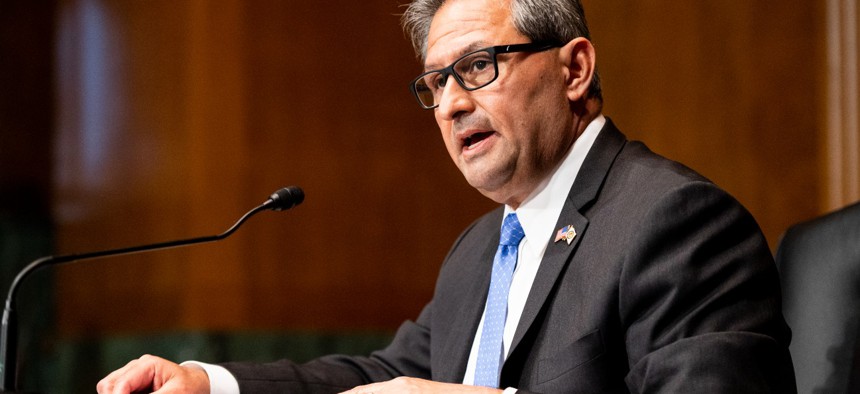
Michael Carvajal will stay on until a new director is appointed. Bill Clark/CQ-Roll Call, Inc via Getty Images
Federal Prisons Agency Director to Retire
This “is an opportunity for new, reform-minded leadership,” said a top Democratic lawmaker.
The much-scrutinized director of the Federal Bureau of Prisons is retiring after 30 years at the agency.
Michael Carvajal, who first came to BOP in 1992, was appointed as director under President Trump in February 2020. He will stay on until a new director is appointed. During his almost two years as director, he faced much pushback from lawmakers, union members and others on issues such as handling of the coronavirus pandemic, security failures at institutions nationwide and the agency’s staffing crisis.
“Director Carvajal assumed leadership of the agency during an unprecedented time, when the United States became subject to the most virulent pandemic in modern history,” said a press release from the agency on Wednesday night. “Despite reports to the contrary, Director Carvajal ensured that the agency adhered to the Centers for Disease Control and Prevention guidance to mitigate and prevent disease transmission, while still managing the secure operation of the largest prison system in the United States.”
The press release also lauded his management of the agency during the devastating Hurricane Ida in late summer 2021, the nationwide protests and civil unrest in summer 2020 as well as how he worked to implement the 2018 First Step Act for criminal justice reform.
“Michael's career has been defined by his commitment to the bureau, to its mission, and to the people we all serve,” said Attorney General Merrick Garland, in a statement. “I am extremely appreciative of Michael's decades of public service, most recently at the helm of one of the most complex missions in the federal government.”
Rep. Fred Keller, R-Pa., chairman of the Congressional Bureau of Prisons Reform Caucus, thanked Carvajal for his service in a statement on Thursday. The caucus met with Carvajal and officials from the agency’s union in September on how to increase transparency and accountability.
“We must build on this dialogue and tackle, head on, issues that were addressed during our meeting like staffing shortages, implementation of the First Step Act, and emergency preparedness,” Keller said. “I look forward to continuing to work with BOP leadership and my colleagues on the BOP Reform Caucus toward our shared goal of reforming the BOP to better secure inmates and improve staffing conditions.”
Shane Fausey, president of the National Council of Prison Locals 33, congratulated Carvajal on his retirement in a statement on Thursday.
“Although our relationship was not perfect, we managed numerous national challenges like the COVID pandemic, nationwide unrest, deployments to the nation's border crisis, the First Step act and responsible prison reform,” Fausey said. “Most of these challenges saw the BOP catapulted into a strategic partner role in the security of our country, both inside and out of our prisons.”
Fausey called on members of Congress to reintroduce the Federal Prison Accountability Act, which would make the BOP director position subject to Senate confirmation because the “revolving door in the director’s office has led to uncertainty, inconsistent priorities, the politicization of the agency, and extended periods of inaction.”
The staffing crisis has persisted for longer than Carvajal’s tenure and has “led to increased suicide rates, unacceptable homicide rates, inadequate response to the COVID crisis, and a disturbing decline in employee wellness,” Fausey said. He added that the Biden administration, attorney general and current Congress “all bear some responsibility” to correct the agency’s shortfalls.
“For years, the Bureau of Prisons has been plagued by corruption, chronic understaffing and mismanagement,” said Sen. Dick Durbin, D-Ill., Senate majority whip and chairman of the Senate Judiciary Committee, in a statement on Tuesday night. “In the nearly two years since Director Carvajal was handpicked by then-Attorney General Bill Barr, he has failed to address the mounting crises in our nation’s federal prison system, including failing to fully implement the landmark First Step Act. His resignation is an opportunity for new, reform-minded leadership at the Bureau of Prisons.”
Since November, Durbin has been calling on Attorney General Merrick Garland to replace Carvajal following an Associated Press investigation that found that the prisons bureau is a “hotbed of abuse, graft and corruption, and has turned a blind eye to employees accused of misconduct.”
The news of Carvajal’s retirement was first reported by The Associated Press.
Hugh Hurwitz, who served as acting director and assistant director for reentry services at the Bureau of Prisons, among other positions, wrote in The Hill on December 23 that the agency needs more than just a change in leadership to fix the prison system’s problems.
One of the ways to do this is to “invest in the recruitment, retention and training of correctional officers, while paying them on par with what other law enforcement officers earn,” he wrote. “While the conduct spotlighted in recent news reports was reprehensible, it does not reflect the majority of BOP officers who put their lives on the line every day, and suffer disproportionately high rates of PTSD and suicide.”
Hurwitz, who noted he was one of six acting directors in just five years, also suggested that Congress and the attorney general follow the Council on Criminal Justice’s Task Force on Federal Priorities’ suggestion to create an independent oversight board for BOP. Hurwitz now consults on prison management and reform and is a member of the Council on Criminal Justice.
Update: This article has been updated with comment from the chairman of the Congressional Bureau of Prisons Reform Caucus and from a union representing prison employees.







